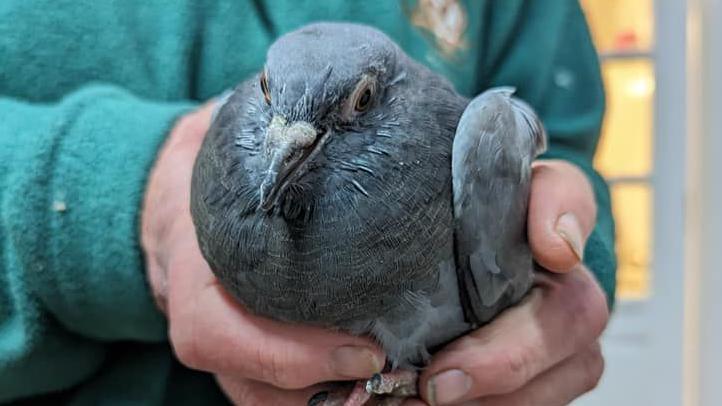The volunteers saving pigeons' feet from litter

- Published
Whether theyβre flapping near your sandwich, strutting into shop doorways, or fluttering at terrified toddlers, Scotlandβs city pigeons definitely have an image problem.
But a group of volunteers are hoping to change that - and also work to save the birds from a condition known as "stringfoot".
Amanda Sykes, a former volunteer coordinator, set up the Happy Feet group in Glasgow about a year ago after being inspired by vegan activists.
So far she estimates the team have caught and detangled 150 pigeons from discarded string, threads, human hair, and other litter that become wrapped in the birds' claws.
If left untreated, it causes disease and even amputation as circulation becomes reduced.
She told ΒιΆΉΤΌΕΔ Radio Scotland: βThe pigeons will be in pain, and theyβll lose their toes and feet, suffering lifelong disability if our team doesnβt rally and go out and rescue them.β
But how to catch a pigeon?
She said, βYou put down seed and you just need incredible patience.β
Stringfoot can cause disease or loss of limbs in pigeons
Once caught, the birdβs head is covered to keep it quiet.
βI have the sleeve of a T-shirt which Iβve cut off and put over them. Eight out of 10 pigeons are subdued by that. They are so vulnerable that they just lie there.β
As shown in videos on the groupβs the strings are then carefully cut off by the volunteers.
She added: βItβs very satisfying, itβs a privilege to be able to catch a bird, and to tend to them. We are a bit like an organisation that does roadside rescue assistance. We kind of do that with the pigeons.
βWe are helping the pigeons, helping the volunteers, but we are also engaging with the public.
"Initially people are sort of in awe that anyone would bother to help a creature thatβs considered by some as flying rats, dirtying our streets.
"But we consider that they are here because humans took their ancestors from the wild.
"We used them for food, kept them in doocots, used them for messages, for eggs, for their flesh. We used them in the wars, for pigeon racing. But they are effectively discarded onto our streets.β